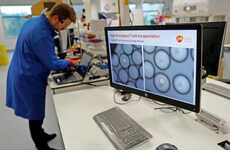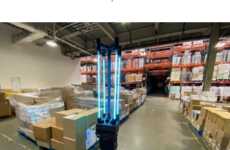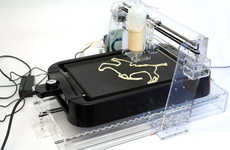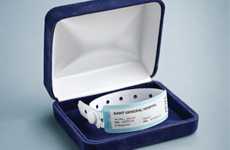
Nanorobots Could Be Able to Isolate and Destroy Cancerous Cells
Rahul Kalvapalle — August 29, 2014 — Tech
Thanks to research from the Davis Cancer Center at the University of California, doctors are working on developing miniature nanorobots that will be able to identify, hunt down and destroy cancerous tumors inside the human body.
The nanorobots can be injected with special tumor-recognition modules; once they identify and isolate affected cells, they can inject drugs directly into them while not harming surrounding healthy cells and tissues. The nanorobots can also infiltrate tumors and activate signals to help doctors better diagnose the tumors.
The use of nanobots to identify and destroy malignant tumors represents a massive improvement over regular chemotherapy treatments, which don't isolate specific cells but instead blast a whole amount of them, resulting in considerable harm and troublesome side-effects.
The nanorobots can be injected with special tumor-recognition modules; once they identify and isolate affected cells, they can inject drugs directly into them while not harming surrounding healthy cells and tissues. The nanorobots can also infiltrate tumors and activate signals to help doctors better diagnose the tumors.
The use of nanobots to identify and destroy malignant tumors represents a massive improvement over regular chemotherapy treatments, which don't isolate specific cells but instead blast a whole amount of them, resulting in considerable harm and troublesome side-effects.
Trend Themes
1. Nanorobot-assisted Cancer Treatment - The development of nanorobots that can identify and destroy cancerous cells represents a disruptive innovation opportunity in the field of cancer treatment.
2. Tumor-targeted Drug Delivery - The use of nanorobots to inject drugs directly into cancer cells without harming surrounding healthy cells opens up new possibilities for targeted drug delivery in the pharmaceutical industry.
3. Enhanced Tumor Diagnosis - Nanorobots capable of infiltrating tumors and activating signals could revolutionize tumor diagnosis methods, presenting disruptive innovation opportunities in the medical imaging industry.
Industry Implications
1. Cancer Treatment - The development of nanorobots for cancer treatment has the potential to disrupt the traditional methods of cancer treatment.
2. Pharmaceuticals - Nanorobots enabling targeted drug delivery to cancer cells could revolutionize the pharmaceutical industry by increasing the effectiveness and reducing side effects of chemotherapy.
3. Medical Imaging - The use of nanorobots for tumor diagnosis and signal activation could disrupt the medical imaging industry by improving accuracy and efficiency in tumor detection.
4.1
Score
Popularity
Activity
Freshness























